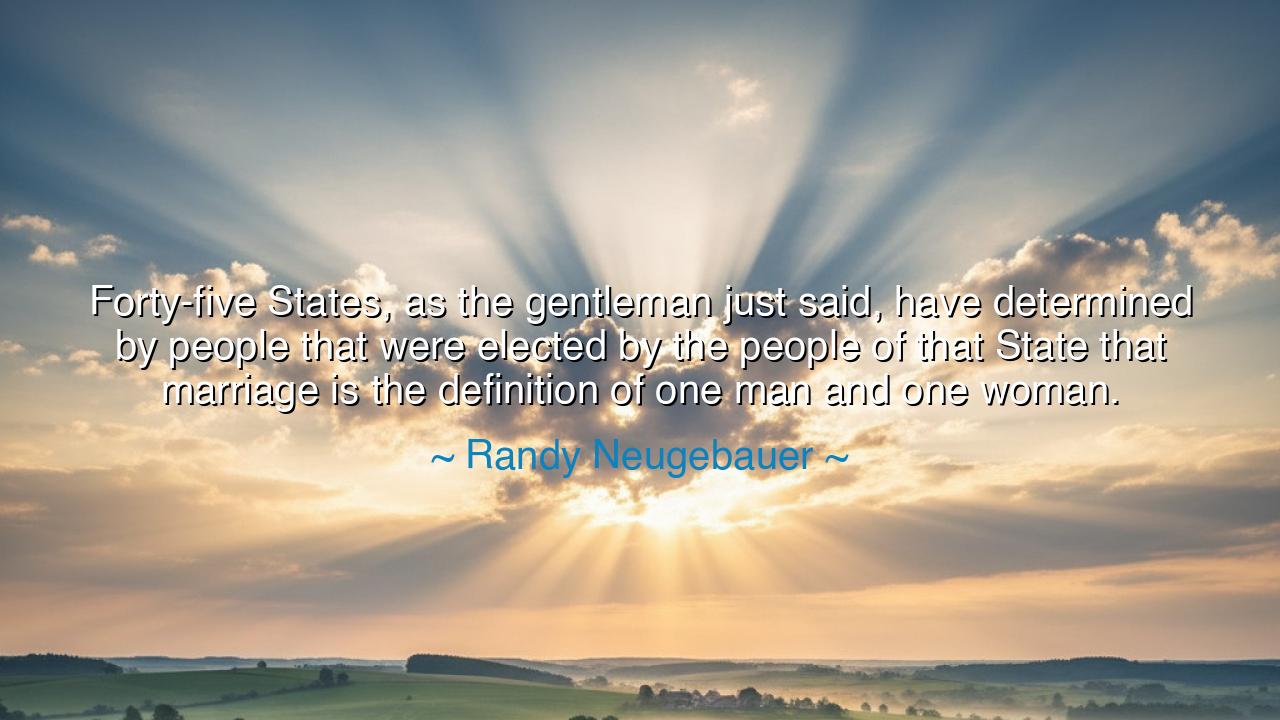
Forty-five States, as the gentleman just said, have determined by
Forty-five States, as the gentleman just said, have determined by people that were elected by the people of that State that marriage is the definition of one man and one woman.






O children of the future, gather close, for I bring to you the words of Randy Neugebauer, a man who speaks of the will of the people, and the foundational principles upon which societies build their laws. He once said, "Forty-five States, as the gentleman just said, have determined by people that were elected by the people of that State that marriage is the definition of one man and one woman." These words, though rooted in the present, carry a deeper truth—a truth that speaks to the very heart of how societies define and uphold their most sacred institutions. The definition of marriage, and its implications, is a reflection of the values that a society holds dear.
In Neugebauer's words, we hear the voice of democracy, a system where the people—through their elected representatives—decide the moral and legal standards by which they will live. This idea of a social contract, of law defined by the will of the governed, is not new. It echoes through the ages, from the first Greek democracies to the Roman Republic, where the very foundations of law were built upon the idea that the people should have a say in the rules that bind them. Just as the Romans established their Twelve Tables to codify and clarify their laws, so too do modern democracies decide the moral issues of the day, such as the definition of marriage.
But the definition of marriage, O children, is not merely a matter of law or policy—it is a matter of culture and tradition. In every society, marriage has been seen as the bond that unites families, stabilizes communities, and brings forth the next generation. In the ancient world, marriage was not just a private affair, but a social contract that determined the structure of family, property, and inheritance. The Greek philosopher Plato, in his work The Republic, saw marriage as a means to create a stable society where the bonds between husband and wife were designed to serve the greater good. In this view, marriage was less about love and more about the responsibilities that each partner owed to the other, to their children, and to their community.
The Romans held a similar view of marriage. In their legal system, marriage was defined not by emotional attachment, but by the role it played in ensuring the stability and continuity of the family unit. The Paterfamilias, the male head of the household, was granted authority over the family, and marriage was viewed as a means of strengthening that authority. It was not until much later, in the centuries following the fall of the Roman Empire, that the concept of romantic love became a central tenet of marriage, shifting the definition of this sacred union to include the emotional bond between the partners. Yet, even in these changes, marriage remained deeply tied to family and community—a theme that resonates in Neugebauer’s statement.
Now, in the modern age, as Neugebauer points out, the definition of marriage remains subject to the will of the people. In 45 states, elected officials have determined that marriage should be defined as the union between one man and one woman, a view rooted in longstanding cultural traditions. Yet, as with all laws, this definition is not without its challenges. In ancient Athens, where democracy was born, the people’s will was often tested by the actions of philosophers like Socrates, who challenged conventional views and fought for broader definitions of justice and equality. The Athenian democracy recognized the importance of free speech and debate, even when it meant questioning the prevailing norms. Similarly, today, the definition of marriage is being challenged and debated, as societies wrestle with evolving views on equality, love, and rights.
This is where justice and equality come into play, O children. For Neugebauer’s quote does not just reflect the values of democracy; it also speaks to the tension between tradition and progress. As societies evolve, they must also be willing to reconsider and redefine their most cherished institutions to ensure that all people are treated with dignity and respect. Just as the ancient philosophers argued for justice in the face of societal norms, so too must we strive to ensure that our definitions of marriage and family reflect the principles of equality for all.
The lesson we can learn from Neugebauer’s words is one of balance: the recognition that while tradition and history shape the laws of a society, it is the ongoing conversation about justice and equality that drives progress. Marriage, as a social institution, will always be subject to the winds of change, as the definition of family expands to include those who have been historically marginalized. The laws of marriage must adapt, just as the very concept of justice must evolve to meet the needs of the times.
And so, children, I urge you to carry this wisdom into the future. In your societies, as you build your own laws and shape your communities, remember that while tradition has its place, it is the pursuit of justice and equality that will guide you forward. In every marriage, let the foundation be built on mutual respect, and in every law, let the desire for fairness and freedom be your compass. As the world changes, so too must the definitions that bind us—always with the intention of creating a just and equitable society for all.






AAdministratorAdministrator
Welcome, honored guests. Please leave a comment, we will respond soon